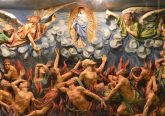Before Christ
What does the Church believe happened to the souls of those who lived before Christ?
Many presume that those souls who lived before Jesus had no opportunity to attain heaven, but the Catholic Church teaches that salvation is a gift from God offered to all people. Those who lived before the coming of Christ were able to attain salvation by their faith in God’s promises and by their response to Jesus when He preached to them in the realm of the dead.
THE PEOPLE OF THE COVENANT
In the Old Testament, God made a covenant with Abraham, promising to be the God of his descendants and to bless all nations through them. This promise was fulfilled in the person of Jesus Christ, the “Lord of Life” and the savior of Jews and Gentiles.
The Church believes that the Old Testament patriarchs and prophets, such as Abraham, Moses and Elijah, were saved by their faith in God’s promises and obedience to God’s commands. As we read in the Book of Genesis, Abraham “put his faith in the Lord, who attributed it to him as an act of righteousness” (15:6). God’s grace was at work in their lives, enabling them to respond in faith. This is why the Church venerates the saints of the Old Testament as heroes of the faith and examples of obedience to God.
THE ABODE OF THE DEAD
In the Apostles’ Creed, we proclaim that after His crucifixion, Jesus “descended into hell.” This phrase is often a source of confusion, leading some to believe that Jesus raised the damned. But “hell” in this context is different: it is the abode of the dead (Sheol in Hebrew or Hades in Greek).
In this so-called hell, all are deprived of the vision of God— but not necessarily for eternity. Rather, in this abode of the dead, souls awaited the Redeemer, and the just responded to his call to salvation: “Jesus did not descend into hell to deliver the damned, nor to destroy the hell of damnation, but to free the just who had gone before him” (Catechism of the Catholic Church, 633).
SALVATION THROUGH CHRIST
Even for those who lived centuries before Jesus, their salvation is from Him. The saints in the abode of the dead were saved by divine grace and their response of faith to Jesus, not by their pre-Christian religious observance. As St. Peter writes in his first epistle: “The gospel was preached even to the dead” (4:6). In going to the dead, Jesus brought the message of salvation to fulfillment. All—from the beginning of time—have the opportunity for redemption. Jesus’ descent to the dead was the last phase of His mission, which, though “condensed in time [is] vast in its real significance” (CCC, 634). Christ’s redemptive work spread to all humanity—peoples of every age, language, religion and place.
THE SOULS OF THE JUST
Christ’s descent to the dead reminds us that just men and women have lived throughout history. As we hear in a passage from the Book of Wisdom, which is often proclaimed at funerals: “The souls of the just are in the hand of God, and no torment shall touch them… They are in peace” (3: 1, 3).
Those who lived before Christ had the opportunity for redemption when Jesus descended into the realm of the dead. This act is considered the fulfillment of the Gospel message and the completion of Jesus’ redemptive work, extending salvation even to those who lived before His time on earth.
 Father David Endres is professor of Church history and historical theology at Mount St. Mary’s Seminary & School of Theology.
Father David Endres is professor of Church history and historical theology at Mount St. Mary’s Seminary & School of Theology.
This article appeared in the December edition of The Catholic Telegraph Magazine. For your complimentary subscription, click here.













